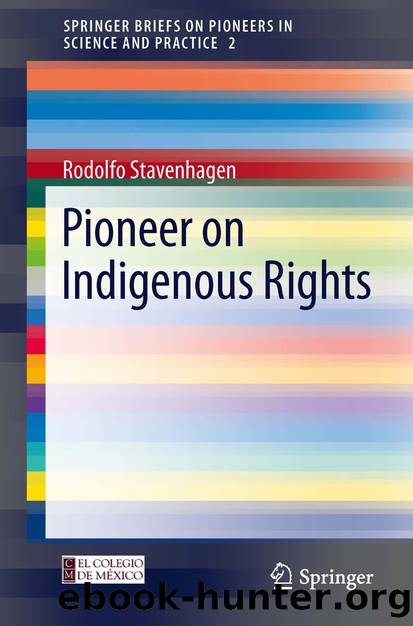Pioneer on Indigenous Rights by Rodolfo Stavenhagen

Author:Rodolfo Stavenhagen
Language: eng
Format: epub
Publisher: Springer Berlin Heidelberg, Berlin, Heidelberg
5.5 Ethnodevelopment
We cannot but recognize that in recent years there has been a resurgence of ethnicity as a mobilizing force all over the world, in underdeveloped as well as in developed countries. It has become a very complex, politically explosive issue. It is related to the burning questions of war and peace, of social harmony and civil strife, of political stability or conflict, and of course, also to fundamental human rights.23
What are the bases for ethnic mobilization in our time? Can we clearly recognize ethnic demands as against other kinds of demands on the political system? In what way is ethnicity related to the process of development? Many authors consider that the individual’s identification with his ethnic group is some form of primordial (even non-rational) group attachment of a universal nature.24 And some have gone so far as to posit that such primary group links constitute an obstacle to nation-building and political development, which require the breaking down of these links and the transfer of loyalties from the primary ethnic group to the larger civi1 society.25 Others would consider that such primordial attachments are not inimical to the building of a larger society but can perfectly well coexist with the requirements of a modern nation. We have here echoes of the old debate on the contrast between ‘Gemeinschaft’ and ‘Gesellschaft’. Perhaps we could go one step further and suggest that ethnic identification and loyalties are again becoming relevant in the modern society where the individual is increasingly alienated, whether in the work-place or in the political bureaucracy. This would, of course, hold more for the industria1 societies than for the Third World. It may help explain the resurgence of ethnicity in, say, the United States and Western Europe. In many instances, the ethnic community becomes a functional intermediate organization (either structured or non-structured) between the individua1 and the polity, such as is the case, at other levels, with trade unions and similar institutions.
For some authors, the activation of ethnicity represents more of a rational choice for political action, rather than a return to primordial sentiments.26 Ethnic demands are said to be used by certain social groups to achieve satisfaction of economic or political interests which would otherwise be more difficult to obtain. This would presumably be the case in clear-cut ethnic majority–minority situations in liberal democracies, in which cultural minorities wi11 never be able to break majority rule. Here ethnic politics or ethnopolitics as it has also been called, becomes pressure politics, and may be used by the politica1 elites of minority groups in their attempt to redress grievances or obtain a ‘larger part of the pie’.
It is generally accepted that at the root of many contemporary ethnic demands we find economic grievances but it would be too simplistic to reduce the whole problem to a form of economic struggle. Wherever we find territorial minorities, such as Indians in Latin America or perhaps scheduled tribes in India, the demands are often for greater control over resources or for greater local autonomy (including, of course, at times, political self-government or independence).
Download
This site does not store any files on its server. We only index and link to content provided by other sites. Please contact the content providers to delete copyright contents if any and email us, we'll remove relevant links or contents immediately.
Killers of the Flower Moon by David Grann(3235)
Machine Learning at Scale with H2O by Gregory Keys | David Whiting(2285)
Will by Will Smith(2040)
Guns, Germs and Steel by Diamond Jared(1882)
Borders by unknow(1785)
The Room Where It Happened by John Bolton;(1720)
The Color of Law by Richard Rothstein(1574)
Once Upon a Broken Heart by Stephanie Garber(1480)
Water Rights and the Environment in the United States by John Burch(1414)
Friends, Lovers, and the Big Terrible Thing by Matthew Perry(1327)
Examples & Explanations: Administrative Law by William F. Funk & Richard H. Seamon(1325)
A Short History of War by Jeremy Black(1299)
HBR's 10 Must Reads 2022 by Harvard Business Review(1255)
Pharmacy Practice and The Law by Richard Abood(1253)
The Strength In Our Scars by Bianca Sparacino(1242)
That Every Man Be Armed by Stephen P. Halbrook(1236)
The Guarded Gate by Daniel Okrent(1219)
515945210 by Unknown(1207)
Injustices by Ian Millhiser(1198)
